Arabic Expressions in Arabic Culture
Arabic expressions often reflect the culture and everyday life of the Arab world, and few topics are as universally relatable as food. In Arabic language and culture, in addition to being a source of nourishment, food serves as a source of symbolism, connection, and even wisdom .
In this blog, we explore 10 fascinating Arabic expressions inspired by food and eating. Each phrase offers a glimpse into the values, humor, and life lessons embedded in the Arabic language, demonstrating how food-related expressions convey everything from resilience and trust to charm and caution.
Let’s take a deeper look into how these tasty expressions capture life’s rich and diverse experiences.

Arabic Expression
أتى على (أََكَلَ) الأخضَرِ واليابِس
Transcription
Atá ʻalá alʼakhḍari wālyābis
Translation
To come at (eat) the green and dry (leaves)
English Equivalent
To destroy everything completely
The Arabic expression “أتى على الأخضر واليابس” means to destroy everything completely or leave nothing behind. This phrase is typically used when someone or something brings about total devastation, sparing neither what is thriving nor what is already withered. There is another variation to it, which is يأكلُ الأخضر واليابس (Yʼklu al-Akhḍar wālyābs), and it means “to eat the green and dry”. The meaning of this phrase is the same.
This metaphor conveys how indiscriminate the destruction is, affecting all that is valuable and flourishing (the green) along with the useless or dead (the dry). The expression paints a vivid picture of an overwhelming force or event that leaves no part untouched, emphasizing the severity and completeness of the impact.

Arabic Expression
خُبزٌ وَمِلح
Transcription
Khubzun wamelḥ
Translation
Bread and salt
English Equivalent
To break bread together
The Arabic phrase “خُبزٌ وَمِلح” symbolizes friendship, loyalty, and the bond created through shared experiences. The phrase comes from the tradition of breaking bread together, where sharing a simple meal—bread and salt—forms a bond that is honored and respected.
In Arab culture, once you have shared “bread and salt” with someone, there’s an unspoken agreement of mutual respect and trust. It’s often used to describe relationships in which a deep sense of loyalty and camaraderie has been established, rooted in the humble act of sharing a meal.
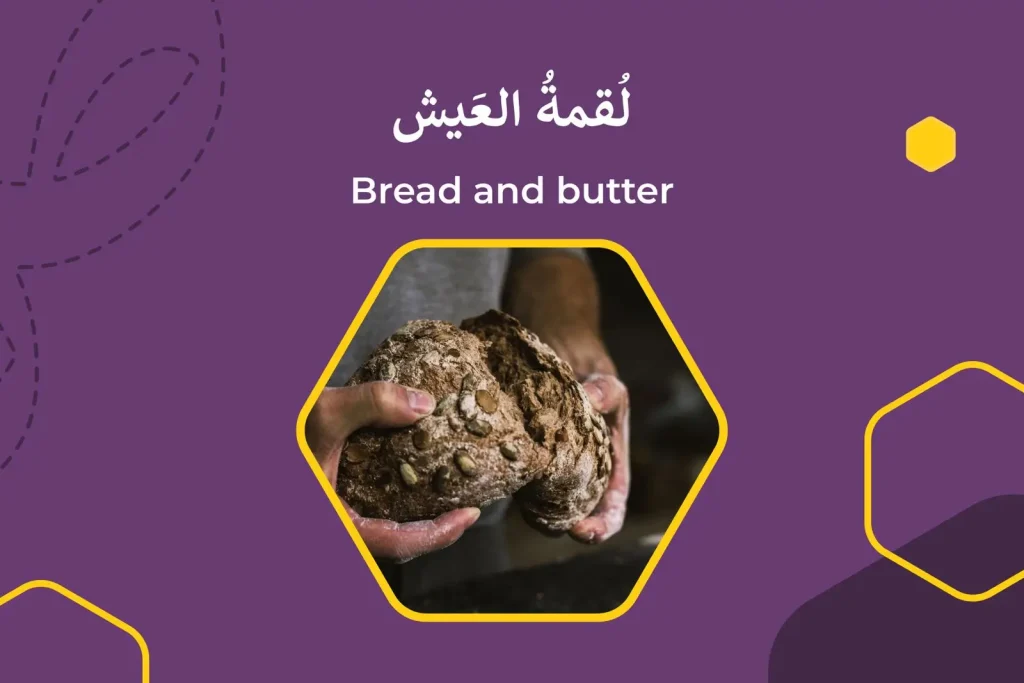
Arabic Expression
لُقمةُ العَيش
Transcription
Luqmatu alʻaysh
Translation
The bite of living
English Equivalent
Bread and butter
The Arabic phrase “لُقمةُ العَيش” refers to one’s basic means of livelihood or daily sustenance. It represents the work, income, or resources required to secure life’s essentials, like food, shelter, and other necessities.
In many Arabic-speaking communities, this phrase conveys the idea of providing for oneself or one’s family. It’s often used to describe the hard work or effort people put into earning a living and emphasizes the dignity and respect associated with providing for one’s needs through honest labor.
In Arab culture, once you have shared “bread and salt” with someone, there’s an unspoken agreement of mutual respect and trust. It’s often used to describe relationships in which a deep sense of loyalty and camaraderie has been established, rooted in the humble act of sharing a meal.

Arabic Expression
كَلامُهُ مِثلُ العَسل
Transcription
Kalāmuhu mithlu alʻasl
Translation
His speech is like honey
English Equivalent
He’s a smooth talker
The Arabic expression “كَلامُهُ مِثلُ العَسل” describes someone who is charming and persuasive with their words—essentially, a smooth talker. This phrase conveys that the person’s way of speaking is sweet, soothing, and attractive, often used to captivate or influence others.
In Arabic culture, comparing speech to honey suggests warmth and allure, but it can sometimes imply that the speaker may be overly flattering or trying to sway others with their charm rather than sincerity. It’s a versatile expression, used to compliment eloquence or, at times, to hint at excessive flattery.
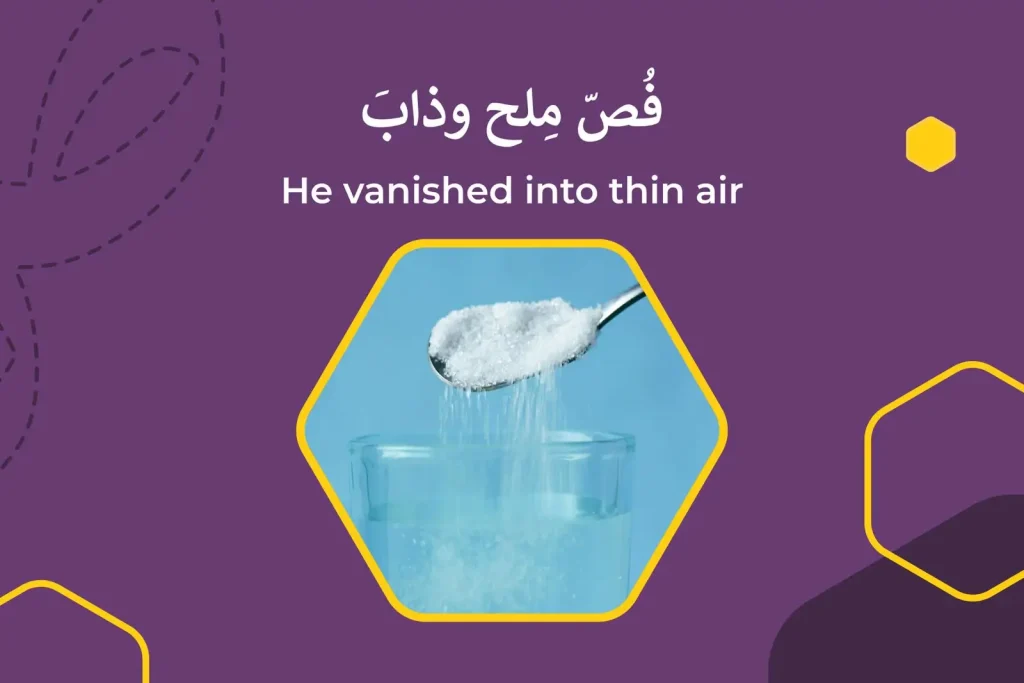
Arabic Expression
فُصّ مِلح وذابَ
Transcription
Fuṣ melḥn wadhāb
Translation
A grain of salt that dissolved
English Equivalent
He vanished into thin air
This phrase describes someone who vanished suddenly and completely, as if they disappeared into thin air. Just like salt dissolves in water and leaves no trace, this phrase suggests that the person left without any sign or warning, making it nearly impossible to trace them.
This expression is often used when someone leaves unexpectedly or becomes unreachable, highlighting the mystery and suddenness of their disappearance. It reflects the subtle and total way they have faded from view, much like salt dissolving instantly in water.
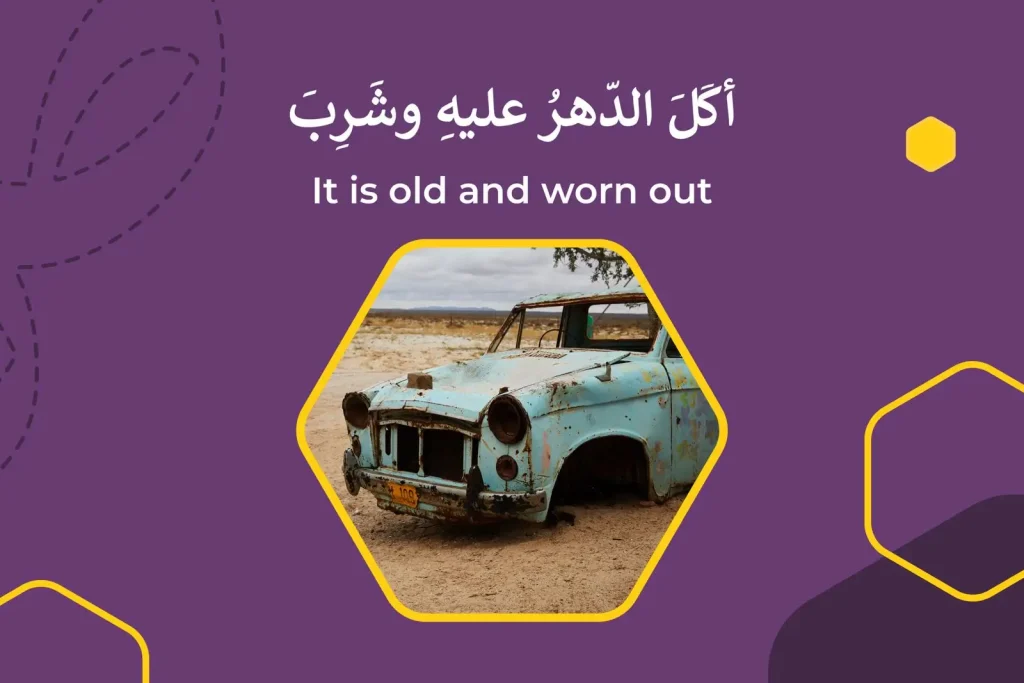
Arabic Expression
أكَلَ الدّهرُ عليهِ وشَرِبَ
Transcription
Akala alddahru ʻalayhi wsharib
Translation
Time has eaten and drunk upon him
English Equivalent
It is old and worn out
You can use the Arabic expression “أكَلَ الدَّهرُ عليهِ وشَرِبَ” to describe something or someone as old, outdated, or worn out. It conveys the idea that time has taken its toll, leaving visible marks of aging, wear, or obsolescence.
This phrase can refer to objects, concepts, or even people who have been around so long that they feel weathered or irrelevant in a modern context. It’s often used with a sense of nostalgia, humor, or critique, emphasizing how time has eroded their former luster or relevance.
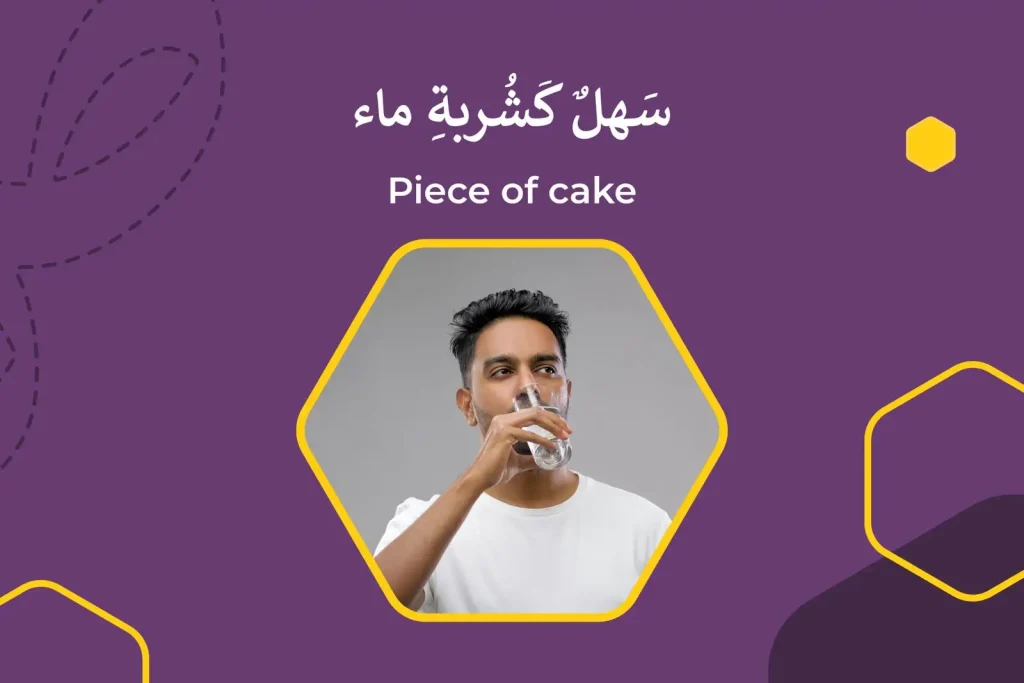
Arabic Expression
سَهلٌ كَشُربةِ ماء
Transcription
Sahlun kashurbati māʼ
Translation
Easy as drinking water
English Equivalent
Piece of cake
The Arabic phrase “سَهلٌ كَشُربةِ ماء” is used to describe something that is effortless or very simple to accomplish—similar to the English expression “a piece of cake.”
This expression conveys how natural and straightforward a task feels, much like taking a sip of water. It highlights that the task requires minimal effort and is free of complications, making it accessible to anyone.
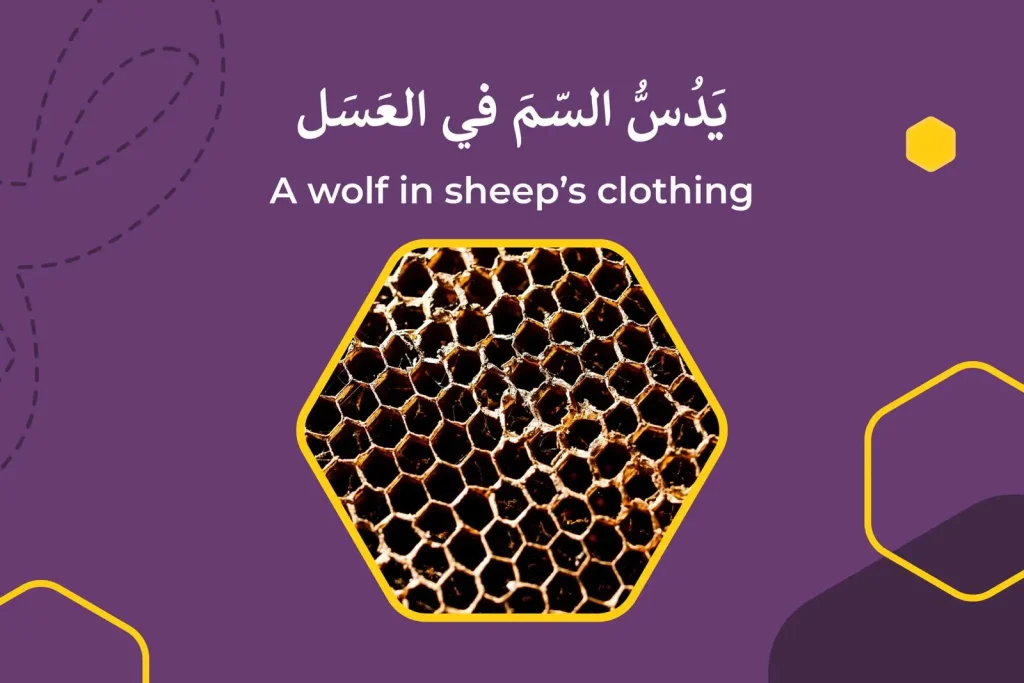
Arabic Expression
يَدُسُّ السّمَ في العَسَل
Transcription
Yadussu alssuma fī alʻasal
Translation
To put poison in honey
English Equivalent
A wolf in sheep’s clothing
The Arabic expression “يَدُسُّ السّمَ في العَسَل” is similar to the English idiom “a wolf in sheep’s clothing.” It describes someone who hides harmful intentions behind a pleasant or charming exterior. This phrase implies deceit and malice masked by sweetness and friendliness.
In Arabic culture, this expression serves as a warning against people who disguise their true intentions with flattering or kind behavior, only to harm others when they least expect it. It captures the idea of betrayal hidden behind an appealing facade.
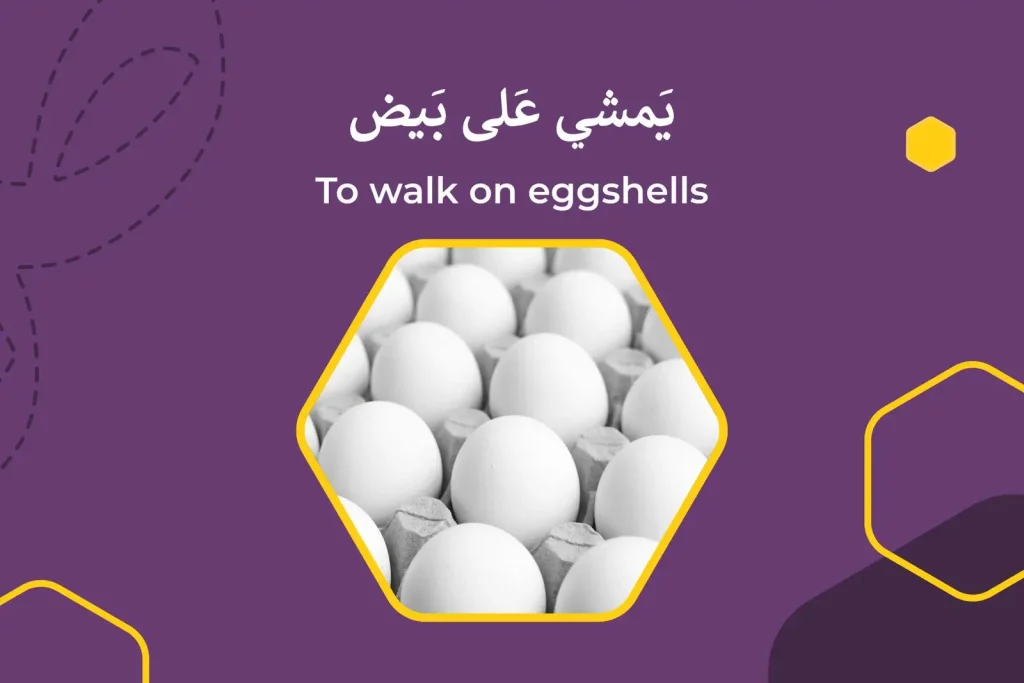
Arabic Expression
يَمشي عَلى بَيض
Transcription
Yamshy ʻalá bayḍ
Translation
To walk on eggs
English Equivalent
To walk on eggshells
The Arabic expression “يَمشي عَلى بَيض” is similar to the English idiom “to walk on eggshells.” It describes a situation where someone must proceed very cautiously to avoid making a mistake or upsetting someone.
This phrase suggests a delicate situation requiring extreme care, just like walking on eggs without breaking them. It often implies that one feels tense or anxious, taking careful steps to maintain peace or avoid triggering a negative reaction.
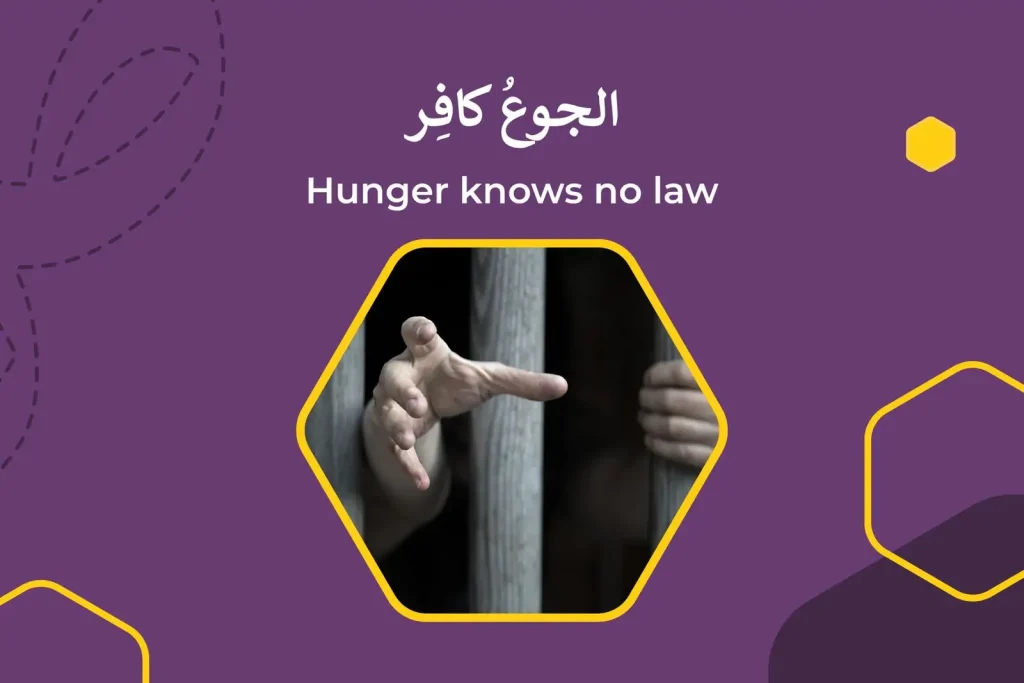
Arabic Expression
الجوعُ كافِر
Transcription
Aljwʻu kāfir
Translation
Hunger is a disbeliever
English Equivalent
Hunger knows no law
This expression reflects the idea that hunger knows no law or morality. It suggests that extreme hunger can drive people to actions they would normally consider unacceptable, highlighting how the desperation of hunger can overshadow principles, faith, or social norms.
This saying underscores the power of basic human needs and how, in times of severe deprivation, even the strongest moral or cultural boundaries may falter. It serves as a reminder of the lengths to which people might go when faced with extreme hardship.
Final word
From honeyed words to grains of salt, these food-inspired Arabic expressions give us a taste of just how rich and lively the language is. Each phrase shows that food in Arabic culture isn’t only for the table—it’s also a way to share life’s ups and downs, make connections, and pass along wisdom.
Hopefully, these expressions added a new layer to how you see Arabic. Maybe they even gave you a few new phrases to try out!
If you liked this article, check out our other blogs, and download AlifBee app for further practice with tons of interesting and fun exercises.








